More than 500 justices on Tuesday demanded that the chief justice of the Supreme Court be elected by lower-court justices as a means of reforming the judicial system, following widespread public outrage over recent verdicts rendered by the court.
Three Taipei District Court justices — Lin Meng-huang (林孟皇), Wu Chiu-hung (吳秋宏) and Yang Kun-chiao (楊坤樵) — held a press conference to announce a campaign to reform the system for appointing the Supreme Court president, who has been roundly criticized for a number of recent rulings.
In one of these cases, Lin said, Supreme Court justices ruled that the lower courts should investigate to see if a child who was allegedly a victim of sexual assault had “consented” to the act. The ruling triggered a “white rose” protest movement against the justices.
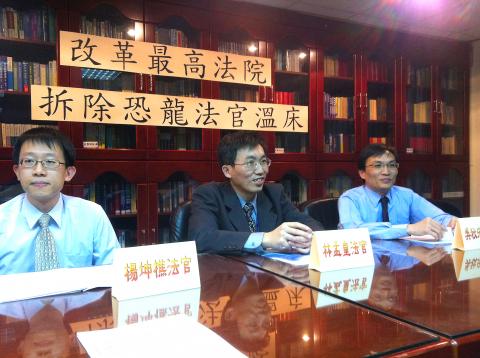
Photo: CNA
These types of inept rulings have sparked widespread criticism that the country’s Supreme Court justices are completely out of touch with today’s reality, said the three lower court judges, who vowed to “take away the dinosaurs’ warm beds.”
They said they represent the Action Alliance of Justices to Elect the Supreme Court Chief Justice, which they said has received signatures of support from 518 of the nation’s 1,888 justices.
The alliance’s foremost demand is the election of the Supreme Court chief justice, because “grassroot-level justices know who is suitable for the job.”
Of the 518, only seven are High Court or second-trial justices and none are from the Supreme Court — the target of the demands for judicial reform.
Lin urged whoever is elected as the nation’s president on Jan. 14 to support judicial reform.
Judicial Yuan President Rai Hau-min (賴浩敏) said in response that flaws in the judicial system could not be rectified by merely changing the Supreme Court president.
An ad hoc committee reviewing the personnel system at the Judicial Yuan has been looking at all the issues related to “realistic reform” of the judicial system, Rai said.
“It will not evade any issue,” Rai said.
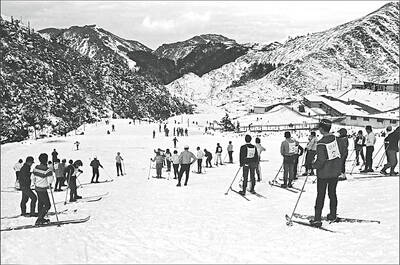
A strong continental cold air mass and abundant moisture bringing snow to mountains 3,000m and higher over the past few days are a reminder that more than 60 years ago Taiwan had an outdoor ski resort that gradually disappeared in part due to climate change. On Oct. 24, 2021, the National Development Council posted a series of photographs on Facebook recounting the days when Taiwan had a ski resort on Hehuanshan (合歡山) in Nantou County. More than 60 years ago, when developing a branch of the Central Cross-Island Highway, the government discovered that Hehuanshan, with an elevation of more than 3,100m,
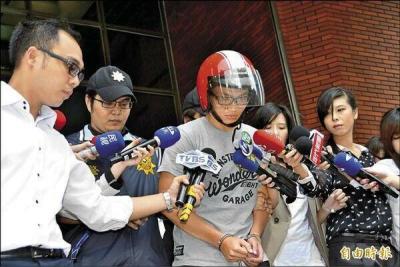
Death row inmate Huang Lin-kai (黃麟凱), who was convicted for the double murder of his former girlfriend and her mother, is to be executed at the Taipei Detention Center tonight, the Ministry of Justice announced. Huang, who was a military conscript at the time, was convicted for the rape and murder of his ex-girlfriend, surnamed Wang (王), and the murder of her mother, after breaking into their home on Oct. 1, 2013. Prosecutors cited anger over the breakup and a dispute about money as the motives behind the double homicide. This is the first time that Minister of Justice Cheng Ming-chien (鄭銘謙) has
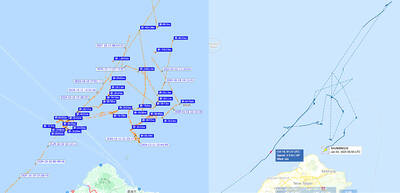
SECURITY: To protect the nation’s Internet cables, the navy should use buoys marking waters within 50m of them as a restricted zone, a former navy squadron commander said A Chinese cargo ship repeatedly intruded into Taiwan’s contiguous and sovereign waters for three months before allegedly damaging an undersea Internet cable off Kaohsiung, a Liberty Times (sister paper of the Taipei Times) investigation revealed. Using publicly available information, the Liberty Times was able to reconstruct the Shunxing-39’s movements near Taiwan since Double Ten National Day last year. Taiwanese officials did not respond to the freighter’s intrusions until Friday last week, when the ship, registered in Cameroon and Tanzania, turned off its automatic identification system shortly before damage was inflicted to a key cable linking Taiwan to the rest of
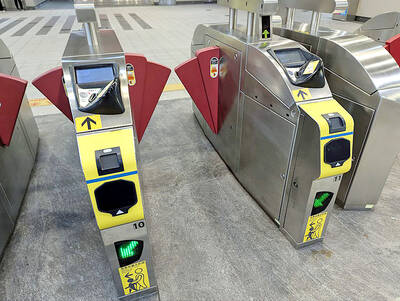
TRANSPORT CONVENIENCE: The new ticket gates would accept a variety of mobile payment methods, and buses would be installed with QR code readers for ease of use New ticketing gates for the Taipei metro system are expected to begin service in October, allowing users to swipe with cellphones and select credit cards partnered with Taipei Rapid Transit Corp (TRTC), the company said on Tuesday. TRTC said its gates in use are experiencing difficulty due to their age, as they were first installed in 2007. Maintenance is increasingly expensive and challenging as the manufacturing of components is halted or becoming harder to find, the company said. Currently, the gates only accept EasyCard, iPass and electronic icash tickets, or one-time-use tickets purchased at kiosks, the company said. Since 2023, the company said it